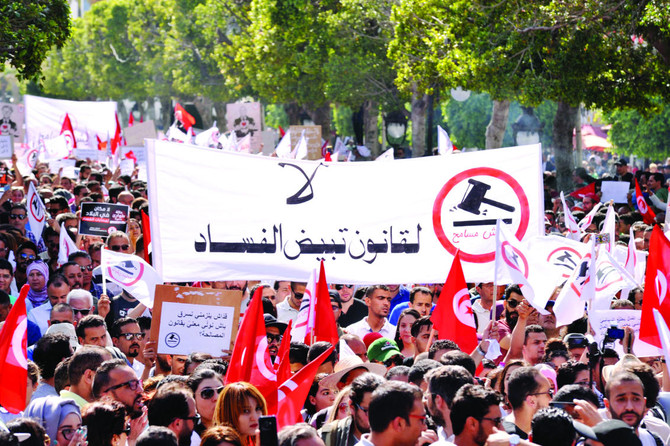TUNIS: Several thousand Tunisians marched through central Tunis on Saturday to protest against a bill that would grant amnesty to businessmen accused of corruption when autocrat Zine El-Abidine Ben Ali was in power.
Critics of the Economic Reconciliation bill say it is a step back from the spirit of Tunisia’s 2011 revolution to oust Ben Ali but government officials say it is a way get the businessmen to inject some of their ill-gotten cash back into the economy.
The draft law allows businessmen to reveal stolen funds and repay them. No exact figures exist for the amount of graft during Ben Ali times but based on past investigations, officials say some $3 billion could be returned initially under the law.
Waving flags and banners saying “No to forgiveness” and “Enough Corruption,” about 5,000 people accompanied by opposition party leaders and activists marched through the capital’s central Avenue Habib Bourguiba.
Six years after the uprising against Ben Ali, Tunisia is praised as a model of democratic transition but it is still struggling with the corruption, economic malaise and youth frustrations that helped trigger the revolt.
For many critics the law — which has been stuck in parliament for two years since President Beji Caid Essebsi proposed it — is simply an amnesty for criminals and a way to rehabilitate Ben Ali allies back into Tunisian society.
“We’re here to say to Essebsi and his cohorts that the law will fall in the street like in all democracies,” Popular Front opposition leader Ammar Amroussia told Reuters. “He wants to pass this corrupt law, but these protests show that we say no.”
Essebsi, himself a former Ben Ali official, sent the law to parliament in 2015 though the bill was delayed after criticism it benefited business elites tied to the government. It is now being debated in committee and then goes to a plenary session.
Despite a consensus between secular and Islamist parties that helped keep Tunisian stable after the uprising, the bill has divided Tunisians between those who want to close the door on the past and those who say they cannot tolerate corruption.
Protests against the law, and others in the south of Tunisia this month over jobs, come at a sensitive time for Prime Minister Youssef Chahed who is struggling to pass austerity measures and public spending reforms to help economic growth.
Despite its democratic progress, free elections and new constitution, Tunisia still faces social unrest among many young unemployed who feel their revolution against official abuses and corruption has not delivered economic opportunities.
“Today we are saying the defenders of the revolution are still here,” said protester Sabra Chrifa, wearing a T-Shirt with the slogan “No Forgiveness.” “We can’t accept something that whitewashes corruption like this.”
Tunisians protest over corruption amnesty bill
Tunisians protest over corruption amnesty bill

UN chief condemns Israeli law blocking electricity, water for UNRWA facilities

- The agency provides education, health and aid to millions of Palestinians in Gaza, the West Bank, Jordan, Lebanon and Syria
United Nations Secretary General Antonio Guterres condemned on Wednesday a move by Israel to ban electricity or water to facilities owned by the UN Palestinian refugee agency, a UN spokesperson said.
The spokesperson said the move would “further impede” the agency’s ability to operate and carry out activities.
“The Convention on the Privileges and Immunities of the United Nations remains applicable to UNRWA (United Nations Relief and Works Agency for Palestine Refugees in the Near East), its property and assets, and to its officials and other personnel. Property used by UNRWA is inviolable,” Stephane Dujarric, spokesman for the secretary-general, said while adding that UNRWA is an “integral” part of the world body.
UNRWA Commissioner General Phillipe Lazzarini also condemned the move, saying that it was part of an ongoing “ systematic campaign to discredit UNRWA and thereby obstruct” the role it plays in providing assistance to Palestinian refugees.
In 2024, the Israeli parliament passed a law banning the agency from operating in the country and prohibiting officials from having contact with the agency.
As a result, UNRWA operates in East Jerusalem, which the UN considers territory occupied by Israel. Israel considers all Jerusalem to be part of the country.
The agency provides education, health and aid to millions of Palestinians in Gaza, the West Bank, Jordan, Lebanon and Syria. It has long had tense relations with Israel but ties have deteriorated sharply since the start of the war in Gaza and Israel has called repeatedly for UNRWA to be disbanded, with its responsibilities transferred to other UN agencies.
The prohibition of basic utilities to the UN agency came as Israel also suspended of dozens of international non-governmental organizations working in Gaza due to a failure to meet new rules to vet those groups.
In a joint statement, Canada, Denmark, Finland, France, Iceland, Japan, Norway, Sweden, Switzerland and the United Kingdom said on Tuesday such a move would have a severe impact on the access of essential services, including health care. They said one in three health care facilities in Gaza would close if international NGO operations stopped.











